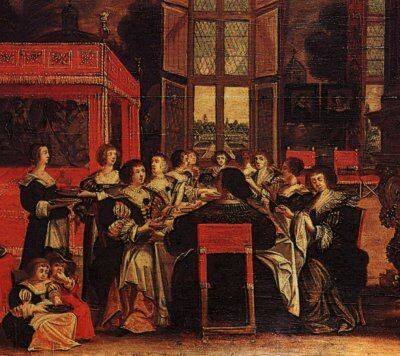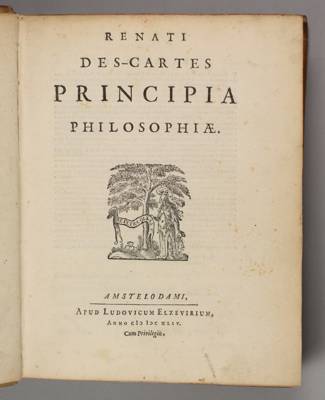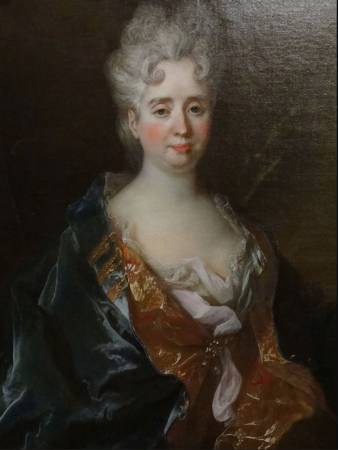The Center of Cultural Innovation: Parisian Salons
You would not get your hair done at these salons—during the Enlightenment in France, salons were a place where civilians of all social classes could gather and discuss ideas. They served as ground zero for the ideas present in the Declaration of Independence and—eventually—the French Revolution!

17th century painting Réunion de dames by French artist, Abraham Bosse. Photo courtesy of Wikimedia Commons.
In the early 1600s, French noblewomen had a real problem: many of them had bright ideas about the society they lived in, but they did not have the means or the formal education to discuss them. Unlike men, they were not allowed to discuss ideas in any official or unofficial setting—while French men had cafés and cercles. Instead, French women came up with another idea. They would find a noblewoman (called a salonnière) to open her home to the public for anyone to gather and freely discuss intellectual ideas. These meetings became known as salons, and as they underwent one serious revolution after the next, the French changed with them.
The Seeds of a Revolution
While they might not seem like a big deal now, French salons at the time were a groundbreaking form of cultural innovation. Not only did they provide platforms for men and women alike to discuss ideas without fear of persecution, but they also allowed for the open exchange of political theory to all economic classes—which, prior to the formation of salons, had not really interacted with one another. Some salons were even centered on a theme or idea, kind of like your local language club or after-school science program.
The French believed that an enlightened and educated society would benefit everyone, so even those who had little or no access to education could learn about and discuss ideas in a salon setting. This spread of ideas during the Enlightenment was critical to the development of the Declaration of Independence, which copied a lot of Enlightenment ideas. The Declaration of Independence inspired and eventually helped start the French Revolution—imagine that an entire revolution occurred just because of widespread access to new ideas and philosophy!
Questioning Authority
The Enlightenment—a.k.a., the Age of Reason—was a period of radical changes in European philosophy during the years 1685-1815, which stressed the importance of religious tolerance, personal liberty (meaning the government cannot interfere with your rights), improving human nature, and the empiricism vs. rationalism argument. The Enlightenment, also, wasn't exactly a quick cultural revolution—the years 1685 to 1815 aren't called the "long 18th century" for nothing!
The movement involved thinkers you've certainly seen in your textbooks by now: Thomas Hobbes, Renee Descartes, John Locke, Voltaire, and some famous writers who used Enlightenment ideas like Thomas Paine and Thomas Jefferson. The movement also involved some figures from the Scientific Revolution like Galileo, Leibniz, and Kepler, who provided the scientific background that basically started the Enlightenment. Many of those Enlightenment ideas still exist today—like separation of church and state and, in the United States, the constitutional right to religious freedom.

"Title page of Renati Des-Cartes Principia philosophiae." Photo courtesy of Wikimedia Commons
In short, the Enlightenment was really just a big break from previously established ways of thinking and basically meant that you are free to think for yourself. While men had the authority to address these ideological changes, women were sort of left out of the picture. To fill this gap and add some more female representation, in comes the main (and largely little-known) event: salons!
Some Serious (Girl) Power
There was no messing around in the salons. Unlike other discussion platforms, salons were reserved for serious intellectual discussion only and all social classes could partake if the salonnière allowed it. This is because the French believed that an enlightened society would benefit everyone. One of the most popular topics was religion—specifically, whether the French should follow religious doctrines without interpreting them for themselves first.
In the salons, noble and upper bourgeoisie women had a lot of power over the conversation. In fact, they had the power to run the conversation. They could set the rules, the place, the means, and even the dialect of the conversation.
Modern scholars like Benedetta Craveri even argue that the salons were the origin of "correct French," which was classified as a distinct form of speech separate from "street banter". Salons were a major leap for women's rights because, well, French thinkers weren't too keen on having women participate in politics—even if they could only participate indirectly. Jean-Jacques Rousseau, for example, wrote that women distract men from their political duties.
While the salons were not exclusive to women, women made some of the most important contributions to French culture in this way—most notably Anne Thérèse de Marguenat de Courcelles, more widely known (and much easier to pronounce) as Madame de Lambert, whose literary salon and views of feminism made her a rare and exciting thinker in the Enlightenment. Madame de Lambert lived in France during Louis XIV's rule and wrote a number of philosophical and political essays for her salon attendees, who were also fellow writers and poets.

Marquise de Lambert Nicolas Largillière. Photo courtesy of Wikimedia Commons.
Two of her most famous works, Counsels from a Mother to her Son and Counsels from a Mother to her Daughter were a set of instructions Madame de Lambert left for her children, emphasizing that the French aristocracy would expect and cultivate different types of morals in their sons than in their daughters. While it was considered to be inappropriate at the time for women (especially aristocratic women of Madame de Lambert's standing) to be writing about such topics, her salon gave her the opportunity to share her ideas with others and eventually, with the world—but not before her works were pirated, without her permission, of course!
Impact
Although the salons did not pave the way for women's rights, they were a profound indicator of what a woman could represent in society: a powerful, kick-butt intellectual who wasn't afraid to speak her mind. Beyond what she could represent as an individual, salons were evidence that women could easily hold political and social roles in society without any help (take that, Rousseau!).
Better yet, salons allowed for people to have greater access to education and information, something not unlike sharing on Facebook, Twitter, and Instagram these days. Just think about how easy it is to access your favorite news sources online, listen to the radio, or check out a book from your local library. Beyond the fact that these everyday specialties came from advances in technology, the Enlightenment principle that we should be an informed and educated society has stayed with us. What other Enlightenment ideas and principles do you see in your every day life?
Want to Learn More?
- Conley, John J. "Anne-Thérèse Marguenat De Courcelles, Marquise De Lambert (1647—1733)" Internet Encyclopedia of Philosophy, 30 Nov, -0001. http://www.iep.utm.edu/lamberta/. Accessed on 25 Jul, 2018.
- "Enlightenment" History.com, A&E Television Networks, 1 Aug, 2009. https://www.history.com/topics/enlightenment. Accessed on 25 Jul, 2018.
- "France in the Age of Les Miserables" Mount Holyoke College, 30 Nov, -0001. https://www.mtholyoke.edu/courses/rschwart/hist255-s01/paris_homework/Enlightenment_salon.html. Accessed on 25 Jul, 2018.
- Kolata, Justine. "A Renaissance of Salon Culture" The Public Sphere: Salons, 30 Nov, -0001. https://www.publicspheresalons.com/whysalons/. Accessed on 25 Jul, 2018.
- "Les Grandes Dames des Salons Parisiens" Becoming Madame, 30 Nov, -0001. https://becomingmadame.wordpress.com/2012/02/24/les-grandes-dames-des-salons-parisiens/. Accessed on 25 Jul, 2018.
- Riding, Alan. "Birth of the Salon" New York Times, 20 Nov, 2000. https://www.nytimes.com/2005/11/20/books/review/birth-of-the-salon.html. Accessed on 25 Jul, 2018.
- Szalay, Jessie. "What Was the Enlightenment?" LiveScience, Purch, 7 Jul, 2016. https://www.livescience.com/55327-the-enlightenment.html. Accessed on 25 Jul, 2018.
- Zundel, Hannah, Sophie duPont, Emily Olsen, and Marisa Rondinelli. "Women's Involvement in the French Salons (Early 18th Century) - ILS202_fall11" Western Culture: Science, Technology, and Philosophy -- 2, Board of Regents of the University of Wisconsin-Madison, 30 Nov, -0001. https://sites.google.com/a/wisc.edu/ils202fall11/home/student-wikis/group4. Accessed on 25 Jul, 2018.